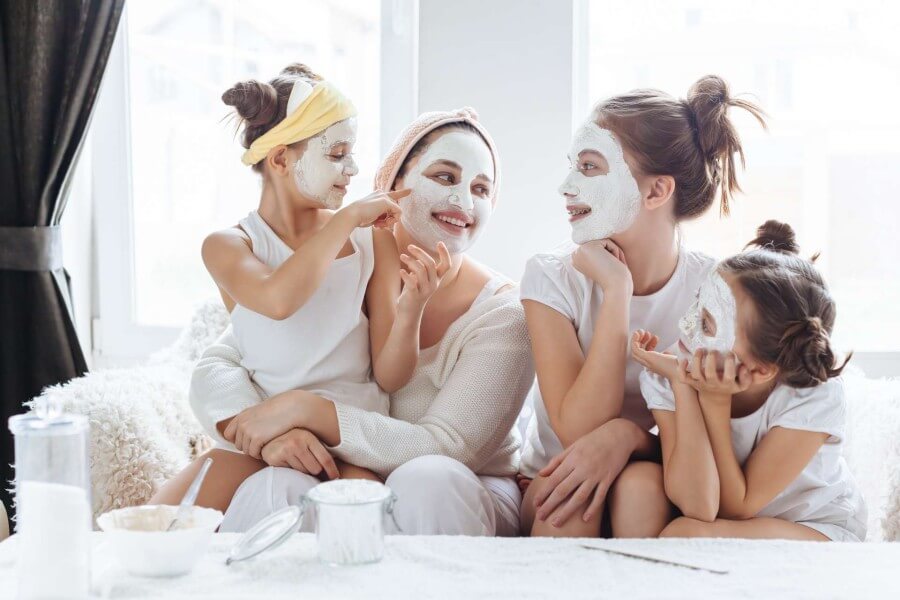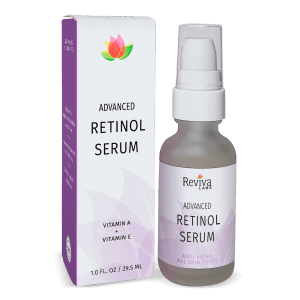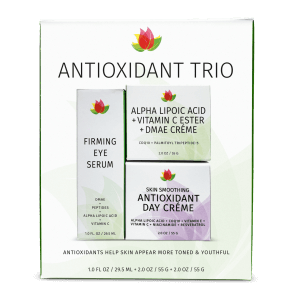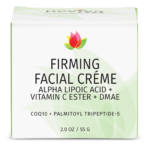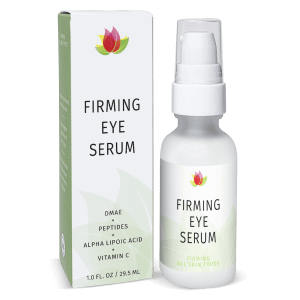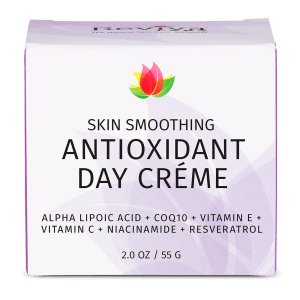Clean Beauty, Ingredients, Reviva Labs, Skin Care
Starting preventative skin care earlier means less to do when you’re older
We receive a lot of questions regarding Reviva’s skin care products and from those seeking skin care guidance in general. But we’ve noticed an increase in a particular question: “at what age should I start a skin care routine?” As soon as possible is our answer. That is, when you start a simple skin care regimen in your twenties – or even your late teens – you’ll achieve two things. First, you’ll be establishing a healthy skin care habit. Second, you’ll be preventing future damage, which is way better than trying to correct existing damage.
Our founder Stephen Strassler traveled in Europe prior to launching Reviva’s initial products. And he often discussed how even decades ago Europe’s approach to skin care differed from skin care in the United States. In Europe, then as in now, prevention is the key to most skin care routines. And you’ll often find young adults mimicking the healthy skin care regimens of their parents.
Whereas in the U.S. at the time Reviva launched, skin care was undeveloped at best, and often touted “corrective” products. So, rather than advocating prevention, it was all about the “quick fix.” It would be nice to say in the last five decades things have changed significantly – but outside skin care and beauty fans – most shoppers still seek out quick fixes. Fortunately, in just the past few years, more and more folks are joining the skin care revolution and slowly adopting a prevention philosophy.
Start your skin care routine at a young age
If young people see their parents living healthy, they generally develop healthy habits too. And this is true for skin care. I can tell you first-hand that my eleven-year-old daughter enjoys clay masks, and moisturizers, and has developed a simple routine – at first by mimicking mom and dad, but later by learning what she liked and what made her skin feel best.
Sure, she has an advantage, because both mom and dad work at a skin care company and can guide her towards which products are good for her to use. But she’s also educating herself and keeping a routine. Which should provide her a good foundation moving forward.
It’s elementary… wear your sunscreen
Even as young adults, prevention is key to avoiding having to fix skin damage later in life. Sunscreen is essential of course, since UV rays can cause significant short-term and long-term skin damage. By making it part of your morning skin care routine you won’t neglect it. Fortunately, lots of skin care products now include some level of SPF, as do many brands of makeup – making it simple to include some form of sunscreen in your day.
Antioxidants should take center stage throughout life
Oxidative stress is a major contributor to skin damage and overall aging. UV radiation is a primary cause of oxidative stress and resulting skin damage – which is why skin professionals continually preach about using sunscreen. But all sorts of environmental stressors can contribute to the production of oxidative stress. Air pollution, cigarette smoking, pesticides, and even emotional stress can lead to the formation of reactive oxygen species (ROS) overload (i.e., oxidative stress).
Our cells and specifically our skin is very good at neutralizing free radicals – the natural by products of cellular metabolism or external stimuli (i.e., UV light). But when these normal countermeasures are overwhelmed the resulting oxidative stress causes cell damage. And in extreme scenarios can cause DNA and resulting cellular mutation – think skin cancer. Moreover, ROS are deemed to play a role in several allergic and inflammatory skin diseases too.
Natural defense mechanisms are produced by our cells to eliminate free radicals before they lead to cellular damage or death. Various enzymes such as superoxide dismutase and organic compounds such as L-ascorbate, a-tocopherol, and CoQ10 neutralize, transform, or destroy free radicals as part of normal cellular function.
Our cells and specifically our skin is very good at neutralizing free radicals – the natural by products of cellular metabolism or external stimuli (i.e., UV light). But when these normal countermeasures are overwhelmed the resulting oxidative stress causes cell damage.
However, intrinsic and extrinsic stresses can overwhelm these natural defenses. Poor diet, overall health issues, or continual stress can undermine the body’s natural abilities. Combined with environmental pressures, oxidative stress can result in cellular damage and premature aging.
Which is why antioxidants should be part of your healthy diet, supplementation, and your skin care routine too. The younger you start to add antioxidants to your skin care routine the earlier you’ll be helping to counteract oxidative stress in the epidermis and dermis. Avoiding or alleviating free-radical damage in the skin helps to prevent premature collagen damage and loss, runaway melanogenesis (creating age spots or skin discoloration), and wrinkles and fine lines.
Beneficial antioxidants such as ascorbic acid (Vitamin C), tocopherol (Vitamin E), thiotic acid (Alpha Lipoic Acid), Ubiquinone (CoQ10), nicotinamide (Vitamin B3), and many others help to strengthen the skin’s natural abilities and aid the top layers of the skin to combat oxidative stressors.
Avoiding or quickly addressing free-radical damage is key to maintaining a healthy complexion. And starting at an early age is an excellent preventative step that’s very easy to implement. Day and/or night moisturizes that contain one or more antioxidants are plentiful today. Our Antioxidant Day Crème features six potent antioxidant compounds: Alpha Lipoic Acid, CoQ10, Vitamin C, Vitamin E, Green Tea Extract, Niacinamide, Resveratrol.

Eventually you’ll want to add in retinols and peptides
Eliminating all stress and always living healthy is challenging for the majority. Not to mention, we all eventually age. Fortunately, that’s where today’s skin care science offers more advanced cosmeceutical ingredients. Which is why in your twenties you’ll probably want to add to your skin care routine. To boost your existing routine or to counteract those poor choices we all make during our college years.
Retinol (Vitamin A derivatives) are super beneficial to nearly everyone’s routine. Retinol provides a long list of benefits. From increasing skin cell turnover and helping to curtail blemishes, to boosting collagen, and reducing fine lines and wrinkles. Its versatility makes it the perfect addition to any ongoing skin care routine. And it can be added by itself, or retinols are often incorporated into other creams and serums too. It does have some downsides but for the vast majority adding in a retinol will help to augment your existing skin care routine.
Skin care science has exploded in the past few decades, bringing lots of innovation – and the introduction of peptides (long chain amino acids) was monumental – even if they seem matter of fact today. Matrixyl™ (palmitoyl-pentapeptide-3) was the first peptide to gain widespread notoriety for its collagen boosting abilities. The next big phenomenon Argireline™ (acetyl hexapeptide-3) targeted repetitive movement wrinkle formation. Permutations of each soon followed and peptides began to appear in nearly every skin care formula. Today, you can find a peptide to help with almost any skin care concern.
The proliferation of peptides and their nuanced effects make them another wonderful addition to your skin care routine as you pass through your twenties and enter your thirties. Wrinkle-fighting peptides, collagen-boosting peptides, or brightening peptides can help to avoid or lessen wrinkle formation or reduce the signs of aging. Most products today will feature one or more peptides. The key will be finding the peptide(s) that target your skin concern to treat and prevent the issue you’re worried about.
Hydration is key at all ages
One of the simplest and most important steps (beyond daily sunscreen use) is to keep your skin properly hydrated. Dry or dehydrated skin presents lots of issues and exacerbates underlying issues. Adding humectants such as hyaluronic acid or glycerin to your skin care routine will help to drawn in and retain moisture to your skin. Combine humectants with nourishing oils and emollients, and you’ll maintain properly moisturized skin – which in turn should be healthier skin too.
Drink plenty of water (or fluids in general). Beyond simply adding moisture to your skin topically it’s also best to make sure your entire body is properly hydrated. This means drinking plenty of water – or other liquids – to maintain proper hydration. If you’re dehydrated your skin will be dehydrated too. Proper hydration, inside and outside, will help you maintain a clean and clear glowing complexion.
Start good habits early and enjoy the benefits of prevention
Create a good foundation and you’ll build a solid routine. Which is a fancy way of saying start building good skin care habits when you’re young and you’ll avoid the struggle to correct your misspent youth. We’re not recommending you should start a 12-step daily skin routine that you’ve watched on YouTube or TikTok. Yeah, we think they’re a little crazy too. But if you spent 1-5 minutes morning and night on yourself your skin will look great and future you will thank you. You’ll be the one among your friends getting all the compliments on how terrific your skin looks and how young you look. Of course, they’ll also keep asking for your skin care secrets – which will be the 10 or 20 years you kept up with your simple skin care regimen – your investment in prevention!
References:
- https://www.ncbi.nlm.nih.gov/pmc/articles/PMC4496685/
- https://pubmed.ncbi.nlm.nih.gov/24568458/
- https://www.nature.com/articles/s41598-020-66723-1
- https://www.mindbodygreen.com/articles/what-is-oxidative-stress-and-what-does-it-do-to-skin
- https://onlinelibrary.wiley.com/doi/full/10.1111/ics.12728
- https://www.allure.com/gallery/best-peptide-skin-care-products
- https://www.byrdie.com/polypeptides-in-skincare



